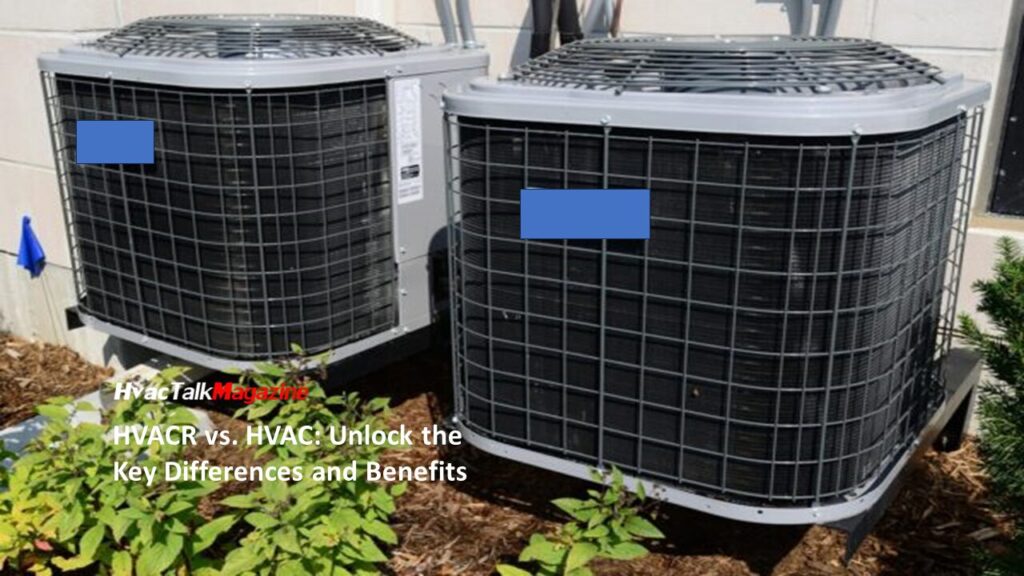HVACR vs. HVAC: Unlock the Key Differences and Benefits
When it comes to managing the climate control systems in buildings, understanding the difference between HVACR and HVAC is essential. These acronyms are often used interchangeably, but they represent distinct systems with unique features and benefits. This guide will help you unlock the key differences and benefits of HVACR and HVAC.
1. Definition and Scope
HVAC
- Heating, Ventilation, and Air Conditioning: HVAC systems are designed to control the temperature, humidity, and air quality in buildings. They provide heating during the winter and cooling during the summer.
- Applications: Commonly found in residential homes, offices, and small commercial buildings.
HVACR
- Heating, Ventilation, Air Conditioning, and Refrigeration: HVACR systems include all HVAC functions in addition to refrigeration. Refrigeration is crucial for food preservation, industrial processes, and medical storage.
- Applications: Used in supermarkets, restaurants, industrial facilities, and healthcare settings, in addition to homes and offices.
2. Components
HVAC Components
- Heating Units: Furnaces, boilers, heat pumps.
- Cooling Units: Air conditioners, heat pumps.
- Ventilation Systems: Ductwork, fans, air filters.
HVACR Components
- Refrigeration Units: Refrigerators, freezers, chillers.
- Additional Components: Besides the standard HVAC components, HVACR systems incorporate refrigeration technology for specific cooling needs.
3. System Complexity
HVAC Systems
- Less Complex: Typically involves fewer components and simpler installations.
- Maintenance: Easier and less frequent maintenance compared to HVACR systems.
HVACR Systems
- More Complex: Includes additional refrigeration components, making the system more intricate.
- Maintenance: Requires specialized knowledge for maintenance and repairs due to the complexity of refrigeration units.
4. Career Opportunities
HVAC Technicians
- Training and Certification: Training in heating, ventilation, and air conditioning systems is required. Certifications like NATE and EPA Section 608 are common.
- Job Scope: Focuses on installing, maintaining, and repairing heating and cooling systems in residential and commercial settings.
HVACR Technicians
- Advanced Training: This requires additional training in refrigeration systems. Certifications such as HVAC Excellence or specialized refrigeration certifications are beneficial.
- Expanded Job Scope: Work on a wider range of systems, including industrial refrigeration and specialized cooling units, leading to more diverse job opportunities.
5. Energy Efficiency
HVAC Systems
- Energy Consumption: Generally, HVAC systems are designed to be energy-efficient, especially modern units with advanced technology.
- Operational Cost: Typically lower operational costs compared to HVACR systems due to fewer components and simpler operation.
HVACR Systems
- Higher Energy Needs: The inclusion of refrigeration units can lead to higher energy consumption.
- Efficiency Improvements: Modern HVACR systems incorporate energy-saving technologies, but overall operational costs may be higher due to refrigeration.
6. Industry Applications
HVAC Systems
- Residential and Small Commercial: Best suited for homes, small offices, and retail spaces where basic climate control is required.
- Limited Scope: Not typically used for applications requiring extensive refrigeration.
HVACR Systems
- Industrial and Commercial: Essential for industries requiring refrigeration, such as food processing, pharmaceuticals, and large-scale commercial operations.
- Wide Scope: Provides comprehensive climate control, including specialized cooling and refrigeration.
7. Choosing the Right System
HVAC
- Best For: Homeowners, small businesses, and offices needing reliable heating and cooling solutions.
- Considerations: Easier to maintain and generally lower in cost.
HVACR
- Best For: Industries and businesses requiring refrigeration, such as supermarkets, restaurants, and hospitals.
- Considerations: Higher initial investment and more complex maintenance needs.
Understanding the differences between HVAC vs. HVACR systems is crucial for making informed decisions about climate control solutions. While HVAC systems are ideal for basic heating and cooling needs, HVACR systems offer comprehensive climate control, including essential refrigeration capabilities. Whether you’re a homeowner, a business owner, or an aspiring technician, knowing these distinctions can help you choose the right system and unlock the full benefits of efficient and effective climate control.
8. HVACR vs. HVAC Online Courses: Which is Right for You?
Choosing between HVACR vs. HVAC online courses can be crucial for your career path. Here are the key differences and benefits of each to help you decide. Recommended Hvacr vs. Hvac are as follows:
TradesmanCE.com – Alabama HVAC: 10% off any TradesmanCE.com CE or pre-license courses using promo code “deal22”. Click to see Alabama HVAC courses!
TradesmanCE.com – Florida HVAC: 10% off any TradesmanCE.com CE or pre-license courses using promo code “deal22”. Click to see Florida HVAC courses!
TradesmanCE.com – Georgia HVAC: 10% off any TradesmanCE.com CE or pre-license courses using promo code “deal22”. Click to see Georgia HVAC courses!
TradesmanCE.com – Iowa HVAC: 10% off any TradesmanCE.com CE or pre-license courses using promo code “deal22”. Click to see Iowa HVAC courses!
TradesmanCE.com – Kansas HVAC: 10% off any TradesmanCE.com CE or pre-license courses using promo code “deal22”. Click to see Kansas HVAC courses!
TradesmanCE.com – Kentucky HVAC: 10% off any TradesmanCE.com CE or pre-license courses using promo code “deal22”. Click to see Kentucky HVAC courses!
TradesmanCE Overall: 10% off TradesmanCE continuing education using the “Deal22” code. Click to see electrical, contractor, plumbing, & HVAC courses.
1. Scope of Training
HVAC Courses
- Focus: Heating, Ventilation, and Air Conditioning.
- Skills Learned: Installation, maintenance, and repair of heating and cooling systems.
- Best For Those looking to work in residential or small commercial settings.
HVACR Courses
- Focus: Heating, Ventilation, Air Conditioning, and Refrigeration.
- Skills Learned: Comprehensive training including refrigeration systems for industrial and commercial applications.
- Best For: Those aiming for a wider range of job opportunities, including industries requiring refrigeration.
2. Certification and Career Opportunities
HVAC Courses
- Certifications: NATE, EPA Section 608.
- Careers: HVAC technician, installer, and maintenance specialist in homes and small businesses.
HVACR Courses
- Certifications: HVAC Excellence, specialized refrigeration certifications.
- Careers: HVACR technician, refrigeration specialist, industrial cooling expert with opportunities in supermarkets, restaurants, and healthcare facilities.
3. Complexity and Specialization
HVAC Courses
- Complexity: Less complex, easier to master.
- Specialization: Focuses on standard climate control systems.
HVACR Courses
- Complexity: More comprehensive, covering refrigeration.
- Specialization: Prepares for specialized and high-demand roles in various industries.
Call to Action
Unlock your potential and choose the right path for your career. Whether you want to focus on traditional HVAC systems or expand your expertise with HVACR, enrolling in online courses can provide the flexibility and knowledge you need. Start your journey today and gain the skills that set you apart in the competitive HVAC industry!
Find and Post Jobs on the HVACJobsCenter
Summary
Heating, ventilation, air conditioning, refrigeration (HVACR), and HVAC systems are both crucial components in controlling the temperature and air quality of a building. While they serve similar purposes, there are some key differences between the two systems.
One of the main differences between HVACR vs. HVAC systems is the inclusion of refrigeration in HVACR systems. HVACR systems are responsible for cooling spaces and maintaining proper temperature levels through the use of refrigerants. This makes them more versatile and suitable for a wider range of applications, such as commercial refrigeration, industrial processes, and food preservation.
On the other hand, HVAC systems typically only include heating, ventilation, and air conditioning components. They are commonly found in residential and commercial buildings and are designed to provide comfortable indoor temperatures and airflow. While HVAC systems can also include advanced ventilation systems to improve air quality, they do not have the capability to provide refrigeration.
In terms of complexity and size, HVACR systems tend to be larger and more intricate than HVAC systems. This is due to the additional components and systems required for refrigeration, such as compressors, condensers, and evaporators. HVACR systems are also typically more expensive to install and maintain compared to HVAC systems.
Another key difference between HVACR and HVAC systems is their energy efficiency. HVACR systems are generally more energy-efficient than HVAC systems, especially when it comes to cooling and refrigeration. This is because HVACR systems are designed to efficiently remove heat from a space using refrigerants, whereas HVAC systems rely on heating and air conditioning units to regulate temperature.
Overall, both HVACR vs. HVAC systems are essential for maintaining comfortable indoor environments and proper air quality. While HVACR systems are more versatile and energy-efficient, HVAC systems are simpler and more cost-effective for smaller residential and commercial applications. Understanding the differences between the two systems can help building owners and operators choose the right solution for their specific needs.
Follow Us on Google Chrome
- To get started, switch to Google Chrome Browser
- Already on our site
- Top right, tap the 3 dots
- Bottom right, tap follow
- You are done.
Learn more and join our mailing list for updates.
This post has been written by Team HVAC Talk Magazine. Stay informed and connected with the latest in HVAC—join us for expert advice, troubleshooting tips, and news updates. Don’t miss out, follow us now! #HVACExperts #HVACTips #StayInformed #HVACProTalk








